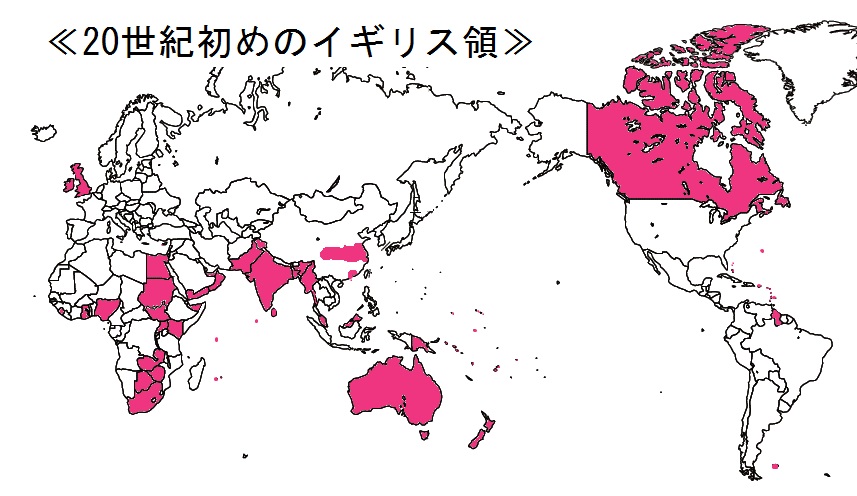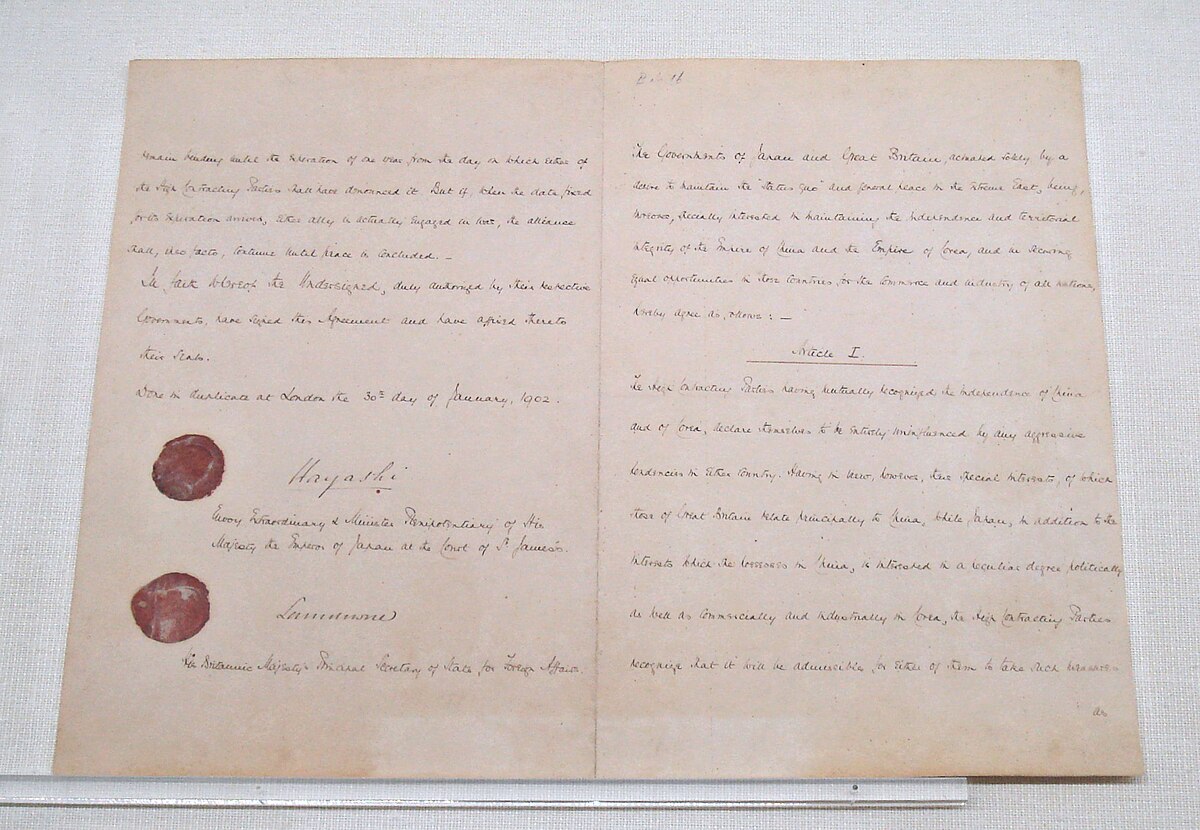イギリスの思惑

イギリスはロシアの南下に警戒を強めます。イギリスの中国における権益(威海衛や香港など)ばかりか、将来的にはインドにまで危機が及ぶとしてことが想定されたからです。ただ、当時のイギリスはボーア戦争などアフリカでの戦争に忙しく、ロシアの相手をする余力がありませんでした。
イギリスは従来、非同盟政策をとっていましたが、ここに来て同盟国を探すことになります。ただし、ドイツは日英同盟を説きつつも矢面に立つことを避けており、フランスはロシアの同盟国、アメリカは非同盟政策、いずれもイギリスの同盟国とはなり得ませんでした。そこで浮上したのが日本でした。
日本の選択

日本もまた、朝鮮半島がロシア領となれば日本もロシアに支配されるのではないか、という思いが強くロシアを怖れていました。いっそ、ロシアと手を組めないか--。という考え方が伊藤博文に代表される「日露協商論(満韓交換論)」とよばれるものです。ロシアには満州の支配を認めるかわりに、日本にも朝鮮での優越権を認めてもらおうという妥協案でした。
伊藤博文はロシアに行き交渉にあたりますが、結果として失敗します。残された方法として有力視されたのが、イギリスとの同盟案でした。
日英同盟の内容

1902年1月30日、イギリスのランズダウン侯爵邸において日英同盟の調印が行われました。日本代表は駐英公使の林董、イギリス代表は第5代ランズダウン侯爵ヘンリー・チャールズ・キース・ペティ=フィッツモーリス外相です。
日英同盟協約 1902年1月30日
The Anglo-Japanese Alliance, January 30,1902前文:
日本国政府及び大不列顛(大ブリテン)政府は偏(ひとえ)に極東に於いて現状及び全局の平和を維持することを希望し、 且つ清帝国及び韓帝国の独立と領土保全とを維持すること及び該二国に於いて各国の商工業をして均等の機会を得せしむことに関し、 特に利益関係を有するを以って茲(ここ)に左の如く約定せり。
The governments of Great Britain and Japan, actuated solely by a desire to maintain the status quo and general peace in the Extreme East, being moreover specially interested in maintaining the independence and territorial integrity of the Empire of China and the Empire of Korea, and in securing equal opportunities in those countries for the commerce and industry of all nations, hereby agree as follows:第1条:
両締約国は相互に清帝国及び韓帝国の独立を承認したるを以って該二国孰(いず)れに於いても全然侵略的趨向に制せらるることなきを声明す。 然れども両締約国の特別なる利益に鑑み即ち其の利益たる大不列顛に取りては主として清国に関し、 また日本国に於いては其の清国に於いて有する利益に加うるに、 韓国に於いて政治上並びに商業上及び工業上格段の利益を有するを以って、 両締約国は若し右等利益にして別国の侵略的行動に因り、 若しくは清国又は韓国に於いて両締約国孰れか其の臣民の生命及び財産を保護する為干渉を要すべき発生に因りて侵迫せられたる場合には、 両締約国孰れも該利益を擁護する為必要欠くべからざる措置を執り得べきことを承認す。
ARTICLE I:
The High Contracting Parties, having mutually recognized the independence of China and Korea, declare themselves to be entirely uninfluenced by any aggressive tendencies in either country. Having in view, however, their special interests of which those of Great Britain relate principally to China, while Japan, in addition to the interests which she possesses in China, is interested in a peculiar degree politically as well as commercially and industrially in Korea, the High Contracting Parties recognise that it will be admissible for either of them to take such measures as may be indispensable in order to safeguard those interests if threatened either by the aggressive action of any other Power, or by disturbances arising in China or Korea, and necessitating the intervention of either of the High Contracting Parties for the protection of the lives and property of its subjects.第2条:
若し日本国または大不列顛国の一方が上記各自の利益を防護する上に於いて別国と戦端を開くに至りたる時は、 他の一方の締約国は厳正中立を守り併せて其の同盟国に対して他国が交戦に加わるを妨ぐることに努むべし。
ARTICLE II:
If either Great Britain or Japan, in the defence of their respective interests as above described, should become involved in war with another Power, the other High Contracting Party will maintain a strict neutrality, and use its efforts to prevent other Powers from joining in hostilities against its ally.第3条:
上記の場合において若し他の一国又は数国が該同盟国に対して交戦に加わるときは、 締約国は来たりて援助を与え協同戦闘に当るべし。 講和も又該同盟国と相互合意の上に於いて之を為すべし。
ARTICLE III:
If in the above event any other Power or Powers should join in hostilities against the Ally, the other High Contracting Party will come to its assistance and will conduct the war in common, and make peace in mutual agreement with it.第4条:
両締約国は孰れも他の一方と協議を経ずして他国と上記の利益を害すべき別約を為さざるべきことを約定す。
ARTICLE IV:
The High Contracting Parties agree that neither of them will, without consulting the other, enter into separate arrangements with another Power to the prejudice of the interests above described.第5条:
日本国若しくは大不列顛国に於いて上記の利益が危殆に迫れりと認むる時は、 両国政府は相互に十分且つ隔意無く通告すべし。
ARTICLE V:
Whenever, in the opinion of either Great Britain or Japan, the above-mentioned interests are in jeopardy, the two Governments will communicate with one another fully and frankly.第6条:
国立公文書館 アジア歴史
本協約は調印の日より直ちに実施し、 該期日より五ヶ年間効力を有するものとす。 若し右五ヶ年間の終了に至る12ヶ月前に締約国の孰れよりも本協約を廃止するの意思を通告せざるときは、 本協約は一方が廃棄の意思を表示したる当日より1ヵ年の終了に至る迄は引き続き効力を有するものとす。 然れども右終了期日に至り同盟国の一方が現に交戦中なる時は、本同盟は講和結了に至る迄当然継続するものとす。
ARTICLE VI:
The present Agreement shall come into effect immediately after the date of its signature, and remain in force for five years from that date. In case neither of the High Contracting Parties should have notified twelve months before the expiration of the said five years the intention of terminating it, it shall remain binding until the expiration of one year from the day on which either of the High Contracting Parties shall have denounced it. But if, when the date fixed for its expiration arrives, either Ally is actually engaged in war, the alliance shall, ipso fact, continue until peace is concluded.
![レキシル[Rekisiru]](https://rekisiru.com/wp-content/uploads/2021/04/Rekisiru_Logo_v3-1.png)